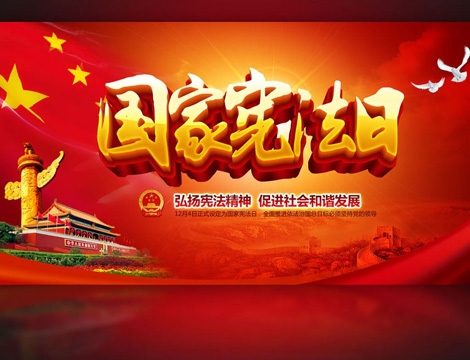Media Report

- CNN reports: "Chinese President Xi Jinping had a good 2017, but 2018 may be looking even better. The ruling Communist Party (CCP) will discuss changing the country's constitution for the first time since 2004 next month, with analysts predicting Xi will further cement his grip on power. The change could clear the way for the creation of a National Supervision Commission (NSC), a country-wide anti-corruption task force with sweeping new powers, though some have speculated there could also be a move to abolish term-limits on the Presidency, allowing Xi to serve on past 2022. This comes on the back of a move by Xi this week to shore up his command of the country's armed forces by moving control of paramilitary police from the government to the CCP... In an editorial Wednesday, the People's Daily, the mouthpiece of the party, said the move was 'a significant political decision ... that will strengthen the party's absolute command over the (People's Liberation Army) and other branches of the people's armed forces and will ensure the stability and prosperity of the party and the nation.' Hong Kong-based China analyst Johnny Lau Yui-siu told the South China Morning Post the move was designed to 'put all China's military power in Xi's hands.'"
- Reuters reports: "China said on Thursday there had been no U.N. sanction-breaking oil sales by Chinese ships to North Korea, after a South Korea newspaper said Chinese and North Korean vessels had been illicitly linking up at sea to get oil to North Korea. The U.N. Security Council last week unanimously imposed new sanctions on North Korea for a recent intercontinental ballistic missile test, seeking to limit its access to refined petroleum products and crude oil. The U.N. resolution seeks to ban nearly 90 percent of refined petroleum exports to North Korea by capping them at 500,000 barrels a year. The U.S.-drafted resolution also caps crude oil supplies to North Korea at 4 million barrels a year and commits the Council to further reductions if it were to conduct another nuclear test or launch another ICBM. China has consistently said it is fully enforcing all resolutions against North Korea, despite suspicion in Washington, Seoul and Tokyo that loopholes still exist."
- ChinaFile comments: "Air and water pollution are rising in China, and so is the number of lawsuits against polluters. Access to the courts is growing: Chinese prosecutors and some NGOs have been empowered to sue polluters, and activist lawyers increasingly participate in lawsuits. Recently, five activist lawyers brought a lawsuit against Beijing, Tianjin, and Hebei Province, charging these local governments with not doing enough to reduce pollution... It remains to be seen how activists and NGOs simultaneously exercising their rights will coexist with state agencies that are punishing polluters... A nationwide increase in lawsuits against polluters has been made possible by modifications in a number of laws... The growing role of lawsuits to punish illegal pollution is welcome, but progress is slow. The ability of NGOs to bring environmental lawsuits against polluters is being contested... The broadening of the scope of environmental public interest cases that can be brought by an expanded range of actors creates possibilities for considerable progress in the use of the legal system to control pollution—if, and only if, the government of Xi Jinping allows it."
Calendar
- 2017-12-27 Trying to fight pollution, China is now the world's largest issuer of 'green' bonds
- 2017-12-26 China's ancient strategies create a new challenge to the west
- 2017-12-22 China to Back Fresh UN Sanctions on North Korea Fuel
- 2017-12-21 Trump and China: 2018 could get nasty
- 2017-12-20 China Shrugs Off Debt Worries as Xi Takes Firmer Economic Grip
- 2017-12-19 China says Trump's new security policy shows 'Cold War mentality'
- 2017-12-18 Trump National Security Strategy Sees U.S. Confronting China and Russia
- 2017-12-17 Trade tussle with China tests the global system
- 2017-12-15 China Is Still Building on Disputed Islands in the South China Sea
- 2017-12-14 China’s ‘long arm’ of influence stretches ever further
News
- CNN China's first constitutional change since 2004 may give Xi Jinping even more power
- Reuters China says no sanction-breaking oil sales to North Korea
- CNBC China is teaming up with a slew of countries to build a new Silk Road — but not everyone is happy
- CNN China says US not doing enough to cut demand for opioids
- The New York Times At an Air Show in China, Drones, Not Jets, Are the Stars
- The New York Times Tibetan Filmmaker Flees to U.S. After 'Arduous' Escape from China
- Quartz A new solar highway in China perfectly captures its clean-energy ambitions
- CNBC Analyst is 'cautious' on Apple iPhone sales due to mixed China data
- Financial Times China moves to impose order on mobile payments boom
- The Guardian China's 'sponge cities' are turning streets green to combat flooding
- Reuters China says more than 18,000 officials failed or performed badly in protecting environment
- The New York Times Geely Buys Stake in Volvo Trucks, Despite China Restrictions
- Reuters Taiwan president says China military causing regional instability
Commentary
- ChinaFile Can Environmental Lawsuits in China Succeed?
- Voice of America US, Germany Condemn China's Sentencing of Human Rights Blogger
- The Diplomat China Plans to Amend Its Constitution
- ChinaFile A Picture of China in 2017
- The Hill Giant Trump dog statue placed outside Chinese mall
- The National Interest There's Only One Way to Stop China from Dominating Asia (Think NATO)
- The Economist China is still a toy-manufacturing powerhouse